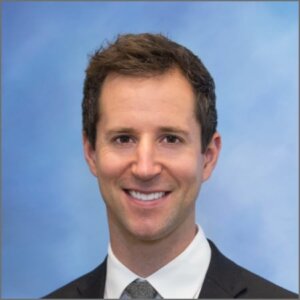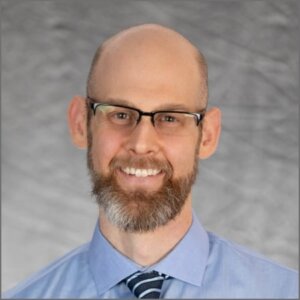
Emergency departments (ED) are critical access points for identifying and starting care for people with opioid use disorder (OUD). As such, the Emergency Department Medication for Opioid Use Disorder (ED MOUD) program, administered by the Community Foundation for Southeast Michigan’s Michigan Opioid Partnership (MOP), provided funds to hospitals throughout the state to establish MOUD protocols and addiction services in their EDs. As recipients ended their grant terms, they implemented low-cost, low-barrier methods for sustaining these essential programs without grant funding. This article highlights how two pioneering hospitals of Michigan’s ED MOUD initiative continue to deliver gold-standard treatment to OUD patients.
Optimizing Community Resources

Dr. Rademacher
Dr. Nick Rademacher, an emergency physician at Trinity Health-Grand Rapids and a MOP Clinical Consultant, described creating the hospital’s MOUD program as resource-intensive at the front end. “We used the grant to put our program in place and formalize it by developing treatment pathways and incentivizing staff training,” he recalled. The hospital also hired a recovery coach for the addiction clinic. “When the grant funding ended last year, we couldn’t afford to keep that position, but everything else remained.”
He said that once Trinity made those initial investments and established connections with community partners for ongoing patient care, the MOUD program went on autopilot. “Because of the grant, treatment for opioid use disorder has become the standard of care in the emergency department,” said Dr. Rademacher. “Getting our staff willing and able to start medication for people with OUD and then refer them rapidly to an outpatient clinic costs no money.”
Losing the recovery coach left a service gap, however. “People with opioid use disorder have psychosocial challenges that interfere with coming to that first appointment or getting their medications. They need the extra support a peer navigator or coach can provide,” said Dr. Rademacher. Mercy started referring patients to a local non-profit with recovery coaches to fill the void. “Using other community resources that someone else is already paying for can sustain your program,” he affirmed. “Once you’ve done that initial legwork to make those connections, it just runs; it’s not an expensive project.”
“Using other community resources that someone else is already paying for can sustain your program,” – Dr. Rademacher
Though Mercy does not rely on medical insurance for sustainability, Dr. Rademacher acknowledges it can encourage providers to offer MOUD as a treatment option. “G2213 is a billing code emergency providers can charge when they start someone on buprenorphine, and Medicare and Medicaid will give them a little bonus,” he said. The insurers offer providers this premium to increase the number of prescriptions for eligible patients.
Partnering with PIHP

Dr. Andrew King
“In terms of getting the medication infrastructure and the providers trained, the grant did exactly what it was designed to do,” said Dr. Andrew King, an emergency department physician at Detroit Medical Center (DMC) and a MOP Clinical Consultant. Like Mercy, DMC needed assistance sustaining access to recovery coaches. The hospital chose to work with the Prepaid Inpatient Health Plan (PIHP) to select a partner to provide peer and recovery coaching services. Administered by the Community Mental Health Association of Michigan, the PIHP manages Medicaid resources for behavioral health.
DMC connected with PIHP provider Detroit Wayne Integrated Health Network (DWIHN), which arranged to place recovery coaches in the ED at no charge to the hospital. The organization screened and referred OUD patients to members of its network. “I couldn’t think of a better symbiotic relationship,” said Dr. King. “DMC gets specialists with tons of experience who can relate to our patients, and DWIHN is referring hundreds of people to their members every year, driving revenue.” Dr. King estimates that 60 to 70 percent of those who consulted with a coach in the past two years entered treatment—over 1,000 patients.
“The partnership with DWIHN contributes to our program’s sustainability. Without it, we’d be forced to maintain a referral relationship with local community resources,” explained Dr. King.
“The partnership with DWIHN contributes to our program’s sustainability. Without it, we’d be forced to maintain a referral relationship with local community resources,” explained Dr. King. He went on to say that sorting through the stipulations presented by each prospective partner regarding the types of patients they could accept would prove onerous to providers.
Leveraging Grant Dollars for Improved Care
Though Drs. Rademacher and King agree the costs to sustain their MOUD ED programs are minimal, they acknowledge that additional grant dollars would benefit their programs. “I wish we had the resources to have peer navigators in our ED because they’d be more readily available to our OUD patients,” said Dr. Rademacher. Dr. King sees additional funding playing a role in quality assurance. He wants to develop a longitudinal care mechanism that captures patients’ referral experiences and how they are progressing with their treatment. “I could also see the funding addressing one of the biggest barriers we encounter in Detroit: transportation,” Dr. King declared. “We have to make sure people can get to and from the hospital and their treatment centers.”
Opioid Settlement Funds may soon make funding available to Mercy, DMC, and other hospitals committed to MOUD care. Dollars have already started flowing into municipalities and the state. The settlement agreement lists MOUD as a core abatement strategy. It details allowable costs in Exhibit E. If hospitals are looking for funding to help with start-up, innovation, scaling, etc., they can contact their local county commissioner or the MDHHS at [email protected] to learn about settlement funding. They can find essential informational resources on the MOP website.
MOP’s Clinical Consultants provide counseling about starting or strengthening an ED MOUD program, connecting with community organizations, understanding billing and reimbursement options, and other free technical assistance. To connect with the MOP Clinical Consultants, complete this form or email [email protected].
